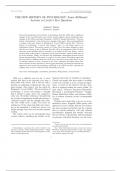Exam (elaborations)
THE NEW HISTORY OF PSYCHOLOGY: Some (Different) Answers to Lovett’s Five Questions
- Course
- Institution
THE NEW HISTORY OF PSYCHOLOGY: Some (Different) Answers to Lovett’s Five Questions Adrian C. Brock Manchester, England The professionalization of the history of psychology from the 1960s led to significant changes in the way that history was written. Several authors tried to summarize thes...
[Show more]



